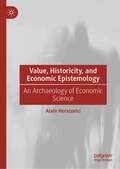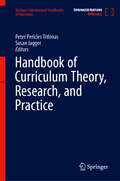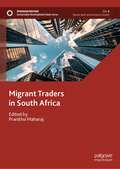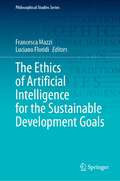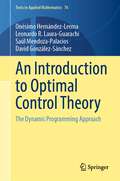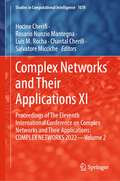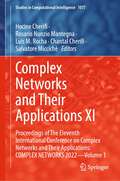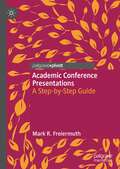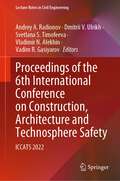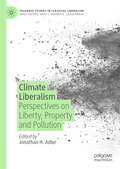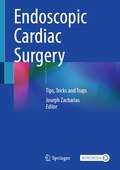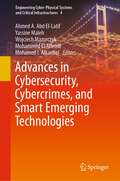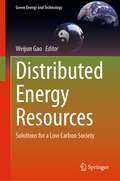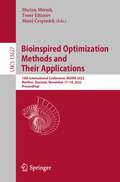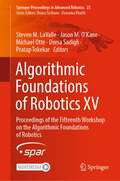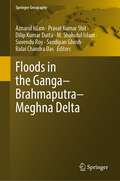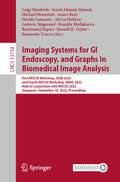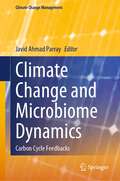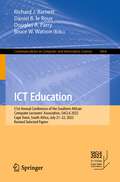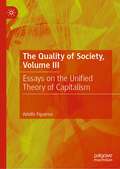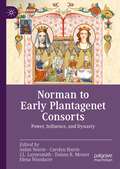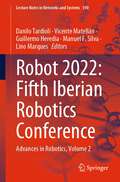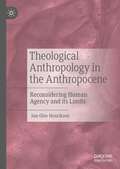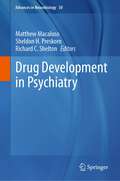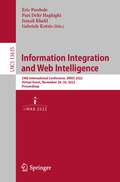- Table View
- List View
Value, Historicity, and Economic Epistemology: An Archaeology of Economic Science
by Alain HerscoviciThis book aims to study, from an approach linked to epistemology and the history of ideas, the evolution of economic science and its differing seminal systems. Today mainstream economics solves certain problems chosen within the scope of “normal science,” without questioning the epistemological foundations that support the paradigm within which they were conceived. Contrary to a Neoclassical interpretation, the historicist interpretation shows that, from the incommensurability of the different paradigms, it is impossible to conceive of a progress of economic science, in a long-term perspective. This book ultimately reveals, from the different economic schools of thought analyzed, that there is no pure form of episteme, or system of understanding. Each concrete episteme in the history of economic thought is by nature hybrid in the sense that it contains components from preceding systems of knowledge.
Handbook of Curriculum Theory, Research, and Practice (Springer International Handbooks of Education)
by Peter Pericles Trifonas Susan JaggerThis Handbook paints a portrait of what the international field of curriculum entails in theory, research and practice. It represents the field accurately and comprehensively by preserving the individual voices of curriculum theorist, researchers and practitioners in relation to the ideas, rules, and principles that have evolved out of the history of curriculum as theory, research and practice dealing with specific and general issues. Due to its approach to both specific and general curriculum issues, the chapters in this volume vary with respect to scope. Some engage the purposes and politics of schooling in general. Others focus on particular topics such as evaluation, the use of instructional objectives, or curriculum integration. They illustrate recurrent themes and historical antecedents and the curricular debates arising from and grounded in epistemological traditions. Furthermore, the issues raised in the handbook cut across a variety of subject areas and levels of educationand how curricular research and practice have developed over time. This includes the epistemological foundations of dominant ideas in the field around theory, research and practice that have led to marginalization based on race, class, gender, sexuality, ethnicity, age, religion, and ability. The book argues that basic curriculum issues extend well beyond schooling to include the concerns of anyone interested in how people come to acquire the knowledge, skills, and values that they do in relation to subjectivity and experience.
Migrant Traders in South Africa (Sustainable Development Goals Series)
by Pranitha MaharajThis edited book examines the social realities of migrant traders in the informal economy in South Africa. It draws on original research conducted with migrant traders in order to understand their lived experiences in light of the COVID-19 pandemic. With chapters on the diverse types of informal trading, urban versus rural settings, migrant women, xenophobia, crime, poverty, well-being and policy responses, the book will be a valuable resource for researchers, scholars, policymakers and development practitioners whose work relates to SDG 8 (Decent Work and Economic Growth).
The Ethics of Artificial Intelligence for the Sustainable Development Goals (Philosophical Studies Series #152)
by Francesca Mazzi Luciano FloridiThis volume provides an extensive overview of the Ethics of Artificial Intelligence for the Sustainable Development Goals. The authors are experts contributing with perspectives from different fields. The comprehensive collection of chapters illustrates the pressing governance problems related to using AI for the SDGs, and case studies describing how AI is advancing and can advance the achievement of the Goals. Students, scholars, and practitioners working on AI for SDGs, the ethical governance of AI, sustainability, and the fourth revolution can find this book a helpful reference.
An Introduction to Optimal Control Theory: The Dynamic Programming Approach (Texts in Applied Mathematics #76)
by Onésimo Hernández-Lerma Saul Mendoza-Palacios David González-Sánchez Leonardo R. Laura-GuarachiThis book introduces optimal control problems for large families of deterministic and stochastic systems with discrete or continuous time parameter. These families include most of the systems studied in many disciplines, including Economics, Engineering, Operations Research, and Management Science, among many others. The main objective is to give a concise, systematic, and reasonably self contained presentation of some key topics in optimal control theory. To this end, most of the analyses are based on the dynamic programming (DP) technique. This technique is applicable to almost all control problems that appear in theory and applications. They include, for instance, finite and infinite horizon control problems in which the underlying dynamic system follows either a deterministic or stochastic difference or differential equation. In the infinite horizon case, it also uses DP to study undiscounted problems, such as the ergodic or long-run average cost. After a general introduction to control problems, the book covers the topic dividing into four parts with different dynamical systems: control of discrete-time deterministic systems, discrete-time stochastic systems, ordinary differential equations, and finally a general continuous-time MCP with applications for stochastic differential equations. The first and second part should be accessible to undergraduate students with some knowledge of elementary calculus, linear algebra, and some concepts from probability theory (random variables, expectations, and so forth). Whereas the third and fourth part would be appropriate for advanced undergraduates or graduate students who have a working knowledge of mathematical analysis (derivatives, integrals, ...) and stochastic processes.
Complex Networks and Their Applications XI
by Hocine Cherifi Rosario Nunzio Mantegna Luis M. Rocha Chantal Cherifi Salvatore MiccicheComplex Networks and Their Applications XI
Complex Networks and Their Applications XI: Proceedings of The Eleventh International Conference on Complex Networks and Their Applications: COMPLEX NETWORKS 2022 — Volume 1 (Studies in Computational Intelligence #1077)
by Hocine Cherifi Rosario Nunzio Mantegna Luis M. Rocha Chantal Cherifi Salvatore MiccichèThis book highlights cutting-edge research in the field of network science, offering scientists, researchers, students, and practitioners a unique update on the latest advances in theory and a multitude of applications. It presents the peer-reviewed proceedings of the XI International Conference on Complex Networks and their Applications (COMPLEX NETWORKS 2022). The carefully selected papers cover a wide range of theoretical topics such as network models and measures; community structure, network dynamics; diffusion, epidemics, and spreading processes; resilience and control as well as all the main network applications, including social and political networks; networks in finance and economics; biological and neuroscience networks and technological networks.
Academic Conference Presentations: A Step-by-Step Guide
by Mark R. FreiermuthThis book provides a step-by-step journey to giving a successful academic conference presentation, taking readers through all of the potential steps along the way—from the initial idea and the abstract submission all the way up to the presentation itself. Drawing on the author's own experiences, the book highlights good and bad practices while explaining each introduced feature in a very accessible style. It provides tips on a wide range of issues such as writing up an abstract, choosing the right conference, negotiating group presentations, giving a poster presentation, what to include in a good presentation, conference proceedings and presenting at virtual or hybrid events. This book will be of particular interest to graduate students, early-career researchers and non-native speakers of English, as well as students and scholars who are interested in English for Academic Purposes, Applied Linguistics, Communication Studies and generally speaking, most of the Social Sciences. With that said, because of the book’s theme, many of the principles included within will appeal to broad spectrum of academic disciplines.
Proceedings of the 6th International Conference on Construction, Architecture and Technosphere Safety: ICCATS 2022 (Lecture Notes in Civil Engineering #308)
by Andrey A. Radionov Dmitrii V. Ulrikh Svetlana S. Timofeeva Vladimir N. Alekhin Vadim R. GasiyarovThis book highlights recent findings in civil and environmental engineering and urban planning, and provides an overview of the state of the art in these fields, mainly in Russia and Eastern Europe. A broad range of topics and issues in modern engineering are discussed, including construction, buildings and structures, advanced materials, innovative technology, methods and techniques in civil engineering, heating, gas supply, water supply and sewerage, foundation engineering, BIM, structural reliability, durability and monitoring, special and unique structures construction (bridge, tunnel, road, railway engineering), design and construction of hydraulic structures, concrete engineering, urban regeneration and sustainable development, urban transport system, engineering structure safety and disaster prevention, water resources engineering, water and wastewater treatment, recycling and reuse of wastewater, etc. The volume gathers selected papers from the 6th International Conference on Construction, Architecture and Technosphere Safety (ICCATS), held in Sochi, Russia in September 2022. The authors are experts in various fields of engineering, and all papers have been carefully reviewed.
Climate Liberalism: Perspectives on Liberty, Property and Pollution (Palgrave Studies in Classical Liberalism)
by Jonathan H. AdlerClimate Liberalism examines the potential and limitations of classical-liberal approaches to pollution control and climate change. Some successful environmental strategies, such as the use of catch-shares for fisheries, instream water rights, and tradable emission permits, draw heavily upon the classical liberal intellectual tradition and its emphasis on property rights and competitive markets. This intellectual tradition has been less helpful, to date, in the development or design of climate change policies. Climate Liberalism aims to help fill the gap in the academic literature examining the extent to which classical-liberal principles, including an emphasis on property rights, decentralized authority and dynamic markets, can inform the debate over climate-change policies. The contributors in this book approach the topic from a range of perspectives and represent multiple academic disciplines. Chapters consider the role of property rights and common-law legal systems in controlling pollution, the extent to which competitive markets backed by legal rules encourage risk minimization and adaptation, and how to identify the sorts of policy interventions that may help address climate change in ways that are consistent with liberal values.
Endoscopic Cardiac Surgery: Tips, Tricks and Traps
by Joseph ZachariasThis book is unique in describing the practical considerations of endoscopic cardiac surgery. It covers this topic from basic concepts such as patient selection to imaging and outlines the different approaches to particular endoscopic cardiac surgical procedures. As there is an increasing acceptance that cardiac surgery needs to be provided to older and sicker patients and more asymptomatic patients, the option of a sternotomy is becoming less appealing. The endoscope has changed the patient pathway in many surgical specialities, but until recently cardiac surgery has been slow to adopt this approach. With improvements in imaging and better imaging technology, there is a steady increase in accepted procedures and trained surgeons offering this approach. Endoscopic Cardiac Surgery: Tips, Tricks and Traps captures the experience of endoscopic cardiac surgeons from around the world and is a concise yet thorough reference book for those starting a program in this discipline. With over 3 hours of associated video material, it will be an essential primer for the discipline, therefore making it a valuable reference for trainees in cardiac surgery and experienced surgeons wishing to add this approach to their armamentarium. Via app: download the SN More Media app for free, scan a link with play button and access MP4 directly on your smartphone or tablet.
Advances in Cybersecurity, Cybercrimes, and Smart Emerging Technologies (Engineering Cyber-Physical Systems and Critical Infrastructures #4)
by Ahmed A. Abd El-Latif Yassine Maleh Wojciech Mazurczyk Mohammed ELAffendi Mohamed I. AlkanhalThis book gathers the proceedings of the International conference on Cybersecurity, Cybercrimes, and Smart Emerging Technologies, held on May 10–11, 2022, in Riyadh, Saudi Arabia. The conference organized by the College of Computer Science of Prince Sultan University, Saudi Arabia. This book provides an opportunity to account for state-of-the-art works, future trends impacting cybersecurity, cybercrimes, and smart emerging technologies, that concern to organizations and individuals, thus creating new research opportunities, focusing on elucidating the challenges, opportunities, and inter-dependencies that are just around the corner. This book is helpful for students and researchers as well as practitioners. CCSET 2022 was devoted to advances in cybersecurity, cybercime, and smart emerging technologies. It was considered a meeting point for researchers and practitioners to implement advanced information technologies into various industries. There were 89 paper submissions from 25 countries. Each submission was reviewed by at least three chairs or PC members and 26 regular papers (30%) were accepted. Unfortunately, due to limitations of conference topics and edited volumes, the Program Committee was forced to reject some interesting papers, which did not satisfy these topics or publisher requirements.
Distributed Energy Resources: Solutions for a Low Carbon Society (Green Energy and Technology)
by Weijun GaoThe future of the distributed energy generation market is promising, with opportunities in the residential, commercial, and industrial sectors driven by increasing awareness of clean energy, greenhouse gas (GHG) emission reduction targets, and rising global demand for energy. This book focuses on UN Sustainable Development Goal 7, which aims to "ensure access to affordable, reliable, sustainable, and modern energy for all." It provides research results, applications, and case studies on the potential of distributed energy resources as a solution to building a low-carbon society. Coverage includes modeling and evaluation of distributed power systems, system maintenance and reliability, economic potential and implications of hydrogen energy systems, grid stabilization and carbon emission reduction, smart design, and the impact of energy penetration on public power grids. Case studies include the effects of renewable energy policies on solar photovoltaic energy in China, Germany, Japan, and the United States of America and a feasibility assessment of distributed energy systems in Shanghai. Distributed Energy Resources: Solutions for a Low Carbon Society will be a valuable resource for postgraduate students and researchers in energy systems, urban energy management, and renewable energy technologies and a reference guide for practicing engineers, urban energy planners, and energy system managers.
Bioinspired Optimization Methods and Their Applications: 10th International Conference, BIOMA 2022, Maribor, Slovenia, November 17–18, 2022, Proceedings (Lecture Notes in Computer Science #13627)
by Marjan Mernik Tome Eftimov Matej ČrepinšekThis book constitutes the refereed proceedings of the 10th International Conference on Bioinspired Optimization Methods and Their Applications, BIOMA 2022, held in Maribor, Slovenia, in November 2022.The 19 full papers presented in this book were carefully reviewed and selected from 23 submissions.The papers in this BIOMA proceedings specialized in bioinspired algorithms as a means for solving the optimization problems and came in two categories: theoretical studies and methodology advancements on the one hand, and algorithm adjustments and their applications on the other.
Algorithmic Foundations of Robotics XV: Proceedings of the Fifteenth Workshop on the Algorithmic Foundations of Robotics (Springer Proceedings in Advanced Robotics #25)
by Steven M. LaValle Jason M. O’Kane Michael Otte Dorsa Sadigh Pratap TokekarThis book includes significant recent research on robotic algorithms. It has been written by leading experts in the field. The 15th Workshop on the Algorithmic Foundations of Robotics (WAFR) was held on June 22–24, 2022, at the University of Maryland, College Park, Maryland. Each chapter represents an exciting state-of-the-art development in robotic algorithms that was presented at this 15th incarnation of WAFR. Different chapters combine ideas from a wide variety of fields, spanning and combining planning (for tasks, paths, motion, navigation, coverage, and patrol), computational geometry and topology, control theory, machine learning, formal methods, game theory, information theory, and theoretical computer science. Many of these papers explore new and interesting problems and problem variants that include human–robot interaction, planning and reasoning under uncertainty, dynamic environments, distributed decision making, multi-agent coordination, and heterogeneity.
Floods in the Ganga–Brahmaputra–Meghna Delta (Springer Geography)
by Aznarul Islam Pravat Kumar Shit Dilip Kumar Datta M. Shahidul Islam Suvendu Roy Sandipan Ghosh Balai Chandra DasThis volume covers the floods of the major rivers of the Ganga-Brahmaputra-Meghna (GBM) Delta, and storm surge related coastal floods in these regions. The book is dedicated to addressing floods from an integrated physical-social perspective to provide students and researchers with a holistic understanding of floods in terms of both human and geomorphological aspects. The systematic coverage of all the major rivers and coastal areas in the GBM delta and surrounding regions will foster a clear comprehension of this dense reservoir of population, where thousands of people are impacted every year due to flood hazards and agricultural destabilization. This comprehensive treatment of flood issues in the region covers flash floods, fluvial floods, fluvio-tidal floods, and coastal floods, and outlines flood management strategies to maintain ecological integrity and environmental stability, and prevent harmful impacts of future floods. The book is intended for students and researchers in earth and environmental sciences, especially geomorphology, hydrology, geography, geology, natural resources management, and regional planning.
Imaging Systems for GI Endoscopy, and Graphs in Biomedical Image Analysis: First MICCAI Workshop, ISGIE 2022, and Fourth MICCAI Workshop, GRAIL 2022, Held in Conjunction with MICCAI 2022, Singapore, September 18, 2022, Proceedings (Lecture Notes in Computer Science #13754)
by Luigi Manfredi Seyed-Ahmad Ahmadi Michael Bronstein Anees Kazi Davide Lomanto Alwyn Mathew Ludovic Magerand Kamilia Mullakaeva Bartlomiej Papiez Russell H. Taylor Emanuele TruccoThis book constitutes the refereed proceedings of the first MICCAI Workshop, ISGIE 2022, Imaging Systems for GI Endoscopy, and the Fourth MICCAI Workshop, GRAIL 2022, GRaphs in biomedicAL Image and analysis, held in conjunction with MICCAI 2022, Singapore, September 18, 2022.ISGIE 2022 accepted 6 papers from the 8 submissions received.This workshop focuses on novel scientific contributions to vision systems, imaging algorithms as well as the autonomous system for endorobot for GI endoscopy. This includes lesion and lumen detection, as well as 3D reconstruction of the GI tract and hand-eye coordination. GRAIL 2022 accepted 6 papers from the 10 submissions received. The workshop aims to bring together scientists that use and develop graph-based models for the analysis of biomedical images and to encourage the exploration of graph-based models for difficult clinical problems within a variety of biomedical imaging contexts.
Climate Change and Microbiome Dynamics: Carbon Cycle Feedbacks (Climate Change Management)
by Javid Ahmad ParrayThe book provides an overview relevant to various biological mechanisms that regulate carbon exchanges between the major components and their response to climate change. Climate change has a significant impact on people's lives, energy demand, food security, etc. The soil microbial ecology is vital for assessing terrestrial and aquatic carbon cycles and climate feedback. However, the primary concern is the complexity of the soil microbial community and its severely affected functions due to the climate and other global changes. Global warming comprises an assessment of the dynamic interactions and feedback between microbes, plants, and their physical environment due to climate change. The book will address the need to use a multifactor experimental approach to understand how soil microorganisms and their activities adapt to climate change and the implications of carbon cycle feedback. The most pressing concern is a clearer understanding of the biological factors that regulate carbon exchanges between land, oceans, and the atmosphere and how these exchanges will respond to climate change via climate–ecosystem feedbacks, which could augment or quell regional and global climate change. Terrestrial ecosystems play an important role in climate feedback as they produce and absorb greenhouse gases like carbon dioxide, methane, and nitrous oxides. They also strongly contribute to storing enormous amounts of carbon in living vegetation and soils, rendering them a significant global carbon sink. If climate change projections are realistic, such a rapid increase in carbon loss from soil could exacerbate the soil carbon cycle feedback. The book will determine the role of microbial feedback in regulating soil-land-atmosphere carbon exchange under changing climatic conditions at the regional and global levels. The current book will also focus on recent research designed to use beneficial microbes such as plant growth-promoting microorganisms, fungi, endophytic microbes, and others to improve understanding of the interaction and their potential role in promoting advanced management for sustainable agricultural solutions. Understanding the influence on the native microbiome, such as the distribution of methanogens and methanotrophs, nutritional content, microbial biomass, and other factors, is becoming increasingly crucial to establishing climate-resilient agriculture.
ICT Education: 51st Annual Conference of the Southern African Computer Lecturers' Association, SACLA 2022, Cape Town, South Africa, July 21–22, 2022, Revised Selected Papers (Communications in Computer and Information Science #1664)
by Richard J. Barnett Daniel B. le Roux Douglas A. Parry Bruce W. WatsonThis book constitutes the refereed proceedings of the 51st Annual Conference of the Southern African Computer Lecturers' Association, SACLA 2022, held in Cape Town, South Africa, during July 21–22, 2022.The 10 full papers were included in this book were carefully reviewed and selected from 31 submissions. They were organized in topical sections as follows: curriculum; assessment; teaching in context; innovative teaching; and pandemic pedagogy.
The Quality of Society, Volume III: Essays on the Unified Theory of Capitalism
by Adolfo FigueroaThis book contains another set of essays dealing with the fundamental economic problems of our time: inequality, environment degradation, and social disorder, which are analyzed in light of the unified theory of capitalism. This theory is a scientific endeavor that seeks to explain the capitalist system taken by parts and then taken as a whole, as a unified theory. By parts, the theory analyzes the First World and the Third World and also the short run, long run, and very long run economic processes, showing why and how economic growth has led to a new epoch, with ecological equilibrium disruption, known as the Anthropocene Age. The empirical predictions of the theory are proven to be consistent with the available facts. Therefore, the theory can be accepted as a good representation of the real-world capitalism; moreover, its derived causality relations become inputs for the debate on the needed science-based policies for the new age. Indeed, this book proposes structural policies to change the way capitalism operates, through changes in its basic institutions, mainly the electoral democracy, which would certainly imply a re-foundation of the capitalist system.
Norman to Early Plantagenet Consorts: Power, Influence, and Dynasty (Queenship and Power)
by Aidan Norrie Carolyn Harris J. L. Laynesmith Danna R. Messer Elena WoodacreThis book examines the emergence of the queen consort in medieval England, beginning with the pre-Conquest era and ending with death of Margaret of France, second wife of Edward I, in 1307. Though many of the figures in this volumes are well known, such as Eleanor of Aquitaine and Eleanor of Castille, the chapters here are unique in the equal consideration given to the tenures of the lesser known consorts, including: Adeliza of Louvain, second wife of Henry I; Margaret of France, wife of Henry the Young King; and even Isabella of Gloucester, the first wife of King John. These innovative and thematic biographies highlight the evolution of the office of the queen and the visible roles that consorts played, which were integral to the creation of the identity of early English monarchy. This volume and its companions reveal the changing nature of English consortship from the Norman Conquest to today.
ROBOT2022: Advances in Robotics, Volume 2 (Lecture Notes in Networks and Systems #590)
by Danilo Tardioli Vicente Matellán Guillermo Heredia Manuel F. Silva Lino MarquesThis book contains a selection of papers accepted for presentation and discussion at ROBOT 2022—Fifth Iberian Robotics Conference, held in Zaragoza, Spain, on November 23-25, 2022. ROBOT 2022 is part of a series of conferences that are a joint organization of SEIDROB—Sociedad Española para la Investigación y Desarrollo en Robótica/Spanish Society for Research and Development in Robotics, and SPR—Sociedade Portuguesa de Robótica/Portuguese Society for Robotic. ROBOT 2022 builds upon several previous successful events, including three biennial workshops and the four previous editions of the Iberian Robotics Conference, and is focused on presenting the research and development of new applications, on the field of Robotics, in the Iberian Peninsula, although open to research and delegates from other countries. ROBOT 2022 featured four plenary talks on state-of-the-art subjects on robotics and 15 special sessions, plus a main/general robotics track. In total, after a careful review process, 98 high-quality papers were selected for publication, with a total of 219 unique authors, from 22 countries.
Theological Anthropology in the Anthropocene: Reconsidering Human Agency and its Limits
by Jan-Olav HenriksenThe Anthropocene presents theology, and especially theological anthropology, with unprecedented challenges. There are no immediately available resources in the theological tradition that reflect directly on such experiences. Accordingly, the situation calls for contextually based theological reflection of what it means to be human under such circumstances. This book discusses the main elements in theological anthropology in light of the fundamental points: a) that theological anthropology needs to be articulated with reference to, and informed by, the concrete historical circumstances in which humanity presently finds itself, and b) that the notion of the Anthropocene can be used as a heuristic tool to describe important traits and conditions that call for a response by humanity, and which entail the need for a renewal of what a Christian self-understanding means. Jan-Olav Henriksen explores what such a response entails from the point of view of contemporary theological anthropology and discusses selected topics that can contribute to a contextually based position.
Drug Development in Psychiatry (Advances in Neurobiology #30)
by Matthew Macaluso Sheldon H. Preskorn Richard C. SheltonThe book reviews clinical trial methodology as it pertains to drug development in psychiatry. The reader will understand the process of drug development in psychiatry from discovery through marketing with the help of clinically relevant examples. The reader will appreciate the history of drug development in psychiatry dating back to the era of serendipitous discovery and culminating in an era of new and highly focused targets. Readers will understand how drug development in psychiatry has changed and adapted with the discovery of novel mechanism of action drugs. Novel drugs and disease targets have changed the way developers and regulatory agencies think about clinical trial methodology.The book elucidates how biomarkers, genetics and advances in neuroscience and neuroimaging have influenced drug development approaches, which will ultimately change the practice of psychiatry. The book will be broken down into the following sections:a. Prior to the 1960s - Drug discovery by chance observationb. The last 50 years – refined targeting of CNS drugs without the discovery of mechanistically new drugsc. The future – the discovery and development of mechanistically new drugs. The examination of new targets, genetics and biomarkers.
Information Integration and Web Intelligence: 24th International Conference, iiWAS 2022, Virtual Event, November 28–30, 2022, Proceedings (Lecture Notes in Computer Science #13635)
by Eric Pardede Pari Delir Haghighi Ismail Khalil Gabriele KotsisThis volume includes the papers presented at the 24th International Conference on Information Integration and Web Intelligence (iiWAS 2022), organized in conjunction with 24th International Conference on Advances in Mobile Computing & Multimedia Intelligence (MoMM2022).The dominant research focus of submitted papers was artificial intelligence and machine learning. The accepted papers presented advances and innovations in an array of areas such as internet of things, virtual and augmented reality, various business applications. iiWAS 2022 attracted 97 papers, from which the Program Committee selected 26 regular papers and 25 short papers.Due to safety concerns as well as other restrictions preventing travel and gatherings, it was decided to organize iiWAS 2022 as a virtual conference.
